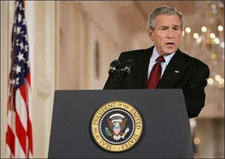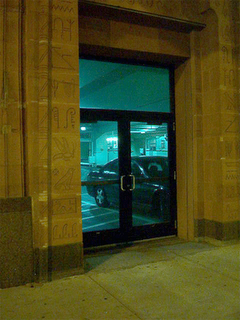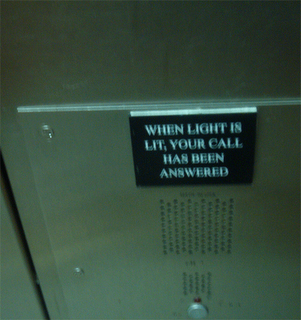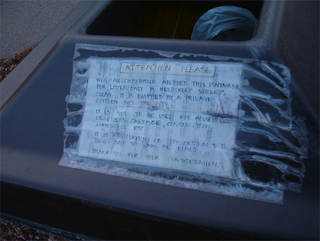
I am just watching the
bush press conference, and it's like watching your aging grandmother forget where she lives. serious schadenfreude. Bush started off with the world's least embraced joke ("Say, why all the glum faces?" ... [20 second pause]). Bush then dropped a trope: He said, "it is clear the democrat party had a good night last night." If that doesn't sound important, you haven't read the
Rick Hertzberg piece on the use of the adjective 'democrat' without the -ic. Well, go to it, and see how high this new verbal fetish has ascended, or how low Bush ahs fallen. Desperate times... &c.
As for the results, my first reactiong is to think about the way the DCCC candidates did poorly overall in this race. Here in Minnesota we had two really competetive House races, Bachmann v. Wetterling in the sububan/exurban 6th district open seat, and Gutknecht (6-term incumbent) v. Walz in the rural 1st district.
The former race was on the DCCC hotlist for many months, and Rahm's campaign commmitee poured a ton of dough into the race -- I think both candidates spent something like $3 million, which is a lot of TV ads. Meanwhile, Walz was chronically underfunded, vastly outspent by his incumbent opponent, and ran a campaign that relied on grassroots volunteering and internet fundraising as much as insitutional support.
And in the end, Walz won by a good margin while Wetterling was trounced. Now, you can say that MN-01 is not as Republican a district as MN-06, or you can say that Wetterling was never a good candidate and that Bachmann has a certian diabolic charisma -- you'd be right. But the fact is that Emmanuel's DCCC invested in the wrong race, and favored the wrong candidate. Here, the DC DLC crowd showed that they're not really in touch with voters.
And Minnesota is not the only place where that happened. The single race where the DCCC went out farthest on the limb was IL-06 (Duckworth v. Roskam), an open seat in Emmanuel's neighboring district. During the primary election, Emmanuel pissed off a lot of people by pushing his candidate, Tammy Duckworth, over local favorite Christine Cegalis.
Then, Rahm poured over $3 million DCCC dollars into the race, and made it the top stopping point for political stump speeches. And last night, Duckworth lost by 2% in an open seat in a big Dem year.
The same thing happened in KY-04, where the DCCC helped out ex-Rep. Ken Lucas. Again, he lost, while at the same time unheralded candidate John Yarmuth, an unabashed liberal, beat a well-funded incumbent with
very little DC support.
I'm kind of dreaming here, but this might be a sign that TV ads are becoming less effective at delivering political messages. It might be a sign that the internet, and old fashioned door knocking combined with a state of the art voter database are the way to go. Finally, it might be a sign that the DLC has their heads up their asses.
Whatever the significance, it just became a lot more fun to watch Bush press conferences. I think the media is going to suddenly find its spine.
Also:Here's a response from an unnamed political operative... currently educating herself at the Sorbonne.
I'm lucky enough to be taking a class with Elaine Kamark (DLC co-founder) and David Gergen (White House advisor to every prez since Nixon except Carter and Bush II, also pundit) and so on occasions like this, I get a sort of unique insight of how the political elite look at these things.
Even Kamark, today, said she thinks that, in the end, Dean is going to get a lot more credit than Rahm will. Especially since so many Dem pickups were in very red states like Indiana - Dean's 50-state strategy, etc.
Both Gergen and Kamark think that TV is increasingly less important in campaigns. Not that campaigns spend less, but that the days of GOTV standing for get-on-TV are over. Have you read Applebee's America? If not, you must.
I think it's becoming more and more clear that the candidates (and on a larger scale, the party) that can win are those who 1. run real campaigns, and by "real" I mean campaigns in which you actually talk to voters and take field seriously and 2. are sincere. Michele Bachmann may be batshit-crazy in that Katherine Harris kind of way, but does anyone doubt her sincerity?
I've been thinking a lot about MN today b/c I think there's a lot to be learned from what happened there: not just in those two races, but in the Gov and Sen races too. some things I've been thinking:
1. It's really hard to beat someone with a compelling personal story. Walz has one. Patty should have one, but she didn't really seem to use it much.
2. I think you're right about the campaigns. Look at the difference between the campaigns that won vs those that lost:
Klobuchar: massive grassroots campaign run by an experienced grassroots organizer and Camp Wellstone trainer (Ben Goldfarb)
Hatch: did the dude even run a campaign? As of this summer, he had two staff members. A gubernatorial campaign should be the standard-bearer, heading up the coordinated campaign, providing a sort of moral leadership. To be honest, I'm shocked that he got as close as he did to winning. Pawlenty ran a much better campaign, and I hate to say it, but he deserved to win.
You already said enough about Patty and Tim. Walz is also just such a good candidate.
The Dems have a really, really big opportunity now. Hope we don't blow it!
 This old building is on the 500 block of Marquette Avenue, right in the heart of the central business district. It's a nice pre-war industrial building, with street-level storefront space, and a entranceway bordered with engraved heiroglyphs. At some point, though, the building was gutted and filled in with a parking ramp, so that now when you walk down Marquette you stroll past this Egyptian doorway leading to a concrete carpark.
This old building is on the 500 block of Marquette Avenue, right in the heart of the central business district. It's a nice pre-war industrial building, with street-level storefront space, and a entranceway bordered with engraved heiroglyphs. At some point, though, the building was gutted and filled in with a parking ramp, so that now when you walk down Marquette you stroll past this Egyptian doorway leading to a concrete carpark.






